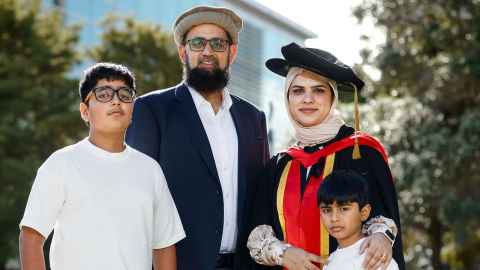Graduate identifies barriers faced by migrant entrepreneurs
13 May 2025
Farzana Adeel’s PhD research uncovers the challenges skilled migrant entrepreneurs face in New Zealand, and looks at what needs to improve to keep them here.

New Zealand pitches itself as an innovation hub for global talent, but what happens after the visas are stamped?
Business School graduate Dr Farzana Adeel's research uncovers the struggles highly skilled immigrant entrepreneurs can face in Aotearoa – challenges that include racism, isolation and a lack of meaningful support.
Despite being high-impact entrepreneurs, investors and innovators, many skilled immigrants who gain visas to work in New Zealand end up leaving.
Farzana says change is needed if Aotearoa wants to retain the innovators it works so hard to attract.
Without inclusive and practical support, New Zealand risks losing the very talent it works to attract – undermining its entrepreneurial ecosystem.
One of six siblings – three sisters and three brothers – Farzana, who graduated with her PhD this May, grew up in Pakistan’s Muzaffarabad, a small city nestled in the foothills of the Himalayas.
“It lies at the confluence of the Neelum and Jhelum rivers, offering a stunning natural landscape; mountains, lush valleys and flowing rivers.
“Houses are stacked on the mountains,” she says of her hometown. “It’s pleasant in spring and summer, and very cold in winter.”
Opportunities for higher education in Muzaffarabad are limited, and Farzana says many ambitious young students head to the capital for university.
Farzana moved to Islamabad for her undergraduate degree and MBA. After getting married, she moved to New Zealand, where her husband Syed Adeel Ali had already settled.
Syed completed a PhD in computer science at the University of Auckland, and the couple have built a life in the city with their two children. They’ve explored much of the country, enjoying hikes and road trips.
But starting over in a new country isn’t easy, and the process of building a business, even for highly skilled migrants, can be incredibly tough, says Farzana, who received a Dean’s Doctoral Scholarship to examine the experiences of immigrant entrepreneurs in Aotearoa.

“Seeing my husband go through the process of launching his software company as an immigrant inspired me to explore what skilled migrants actually experience when they try to build companies here,” she says.
Through interviews with immigrant entrepreneurs who came to New Zealand on entrepreneur and skilled visas, Farzana found that the majority leave within a few years.
“The Global Impact Visa programme was launched in 2017 to attract innovative entrepreneurs with the hope they would bring talent, ideas and resources to benefit the local economy,” she says. “But my research shows that simply attracting talent isn’t enough.”
Many entrepreneurs, she says, face barriers including difficulties in accessing resources and capital and a mismatch between expectations and the local business environment.
“Without inclusive and practical support, New Zealand risks losing the very talent it works to attract – undermining its entrepreneurial ecosystem," she says.
“Often, research on immigrant entrepreneurship assumes highly skilled migrants are part of a global elite who can simply land anywhere, tap into networks, and succeed. But that’s not the case.
“Even highly educated migrants who speak English face cultural barriers, discrimination, and unfamiliar ways of doing business. I wanted to understand how these entrepreneurs manage such challenges.”
Her thesis includes recommendations such as bespoke mentorship, diversified funding incentives and better cultural support within start-up ecosystems.
“It’s important for New Zealand’s business environment to be more inclusive of diverse founders so they can contribute fully and thrive.”
She also notes that immigrant entrepreneurs are often wrongly seen as struggling individuals seeking a better life, rather than talented founders with valuable ideas. This perception, Farzana says, can erode trust and limit collaboration.
“Even entrepreneurs from English-speaking countries like the US and UK reported difficulty integrating. Many found New Zealand’s business culture slow, risk-averse and, at times, unwelcoming.”
To retain global talent, she argues, New Zealand needs to move beyond a “retirement village” mindset and create culturally responsive, tailored support systems for ambitious entrepreneurs.
Teaching gave me the opportunity to build connections and contribute beyond my research, I loved it.
Now a Professional Teaching Fellow and Learning Technologist at the University of Auckland Business School, Farzana balances lecturing, learning design, and family life with her children aged 12 and seven. Summers are often spent in Pakistan, where her husband’s multinational software company, API Matic, has an office.
Farzana says her first year as a doctoral student was particularly challenging. “Sometimes it felt like a lonely journey, and the path felt deeply personal."
But serving as a graduate teaching assistant helped break the isolation.
“Teaching gave me the opportunity to build connections and contribute beyond my research. I loved it,” she says.
“When we first arrived in New Zealand, I didn’t know anyone. But my husband was already a student and part of the Pakistan Student Association, which had so many students of our age. Most had families, and we all quickly became friends. We’d organise meet-ups, picnics and celebrate cultural events like Ramadan together.”
In 2023, Farzana was recognised for her research excellence with the Sid Gray Most Promising Thesis Award from the Australia and New Zealand International Business Academy.
“My PhD journey was exciting, but tough. The first year was very, very tough. If I’d known what it involved, I might not have started. But I’m so glad I did! It’s a wonderful feeling to be graduating.”
Media contact:
Sophie Boladeras, media adviser
M: 022 4600 388
E: sophie.boladeras@auckland.ac.nz